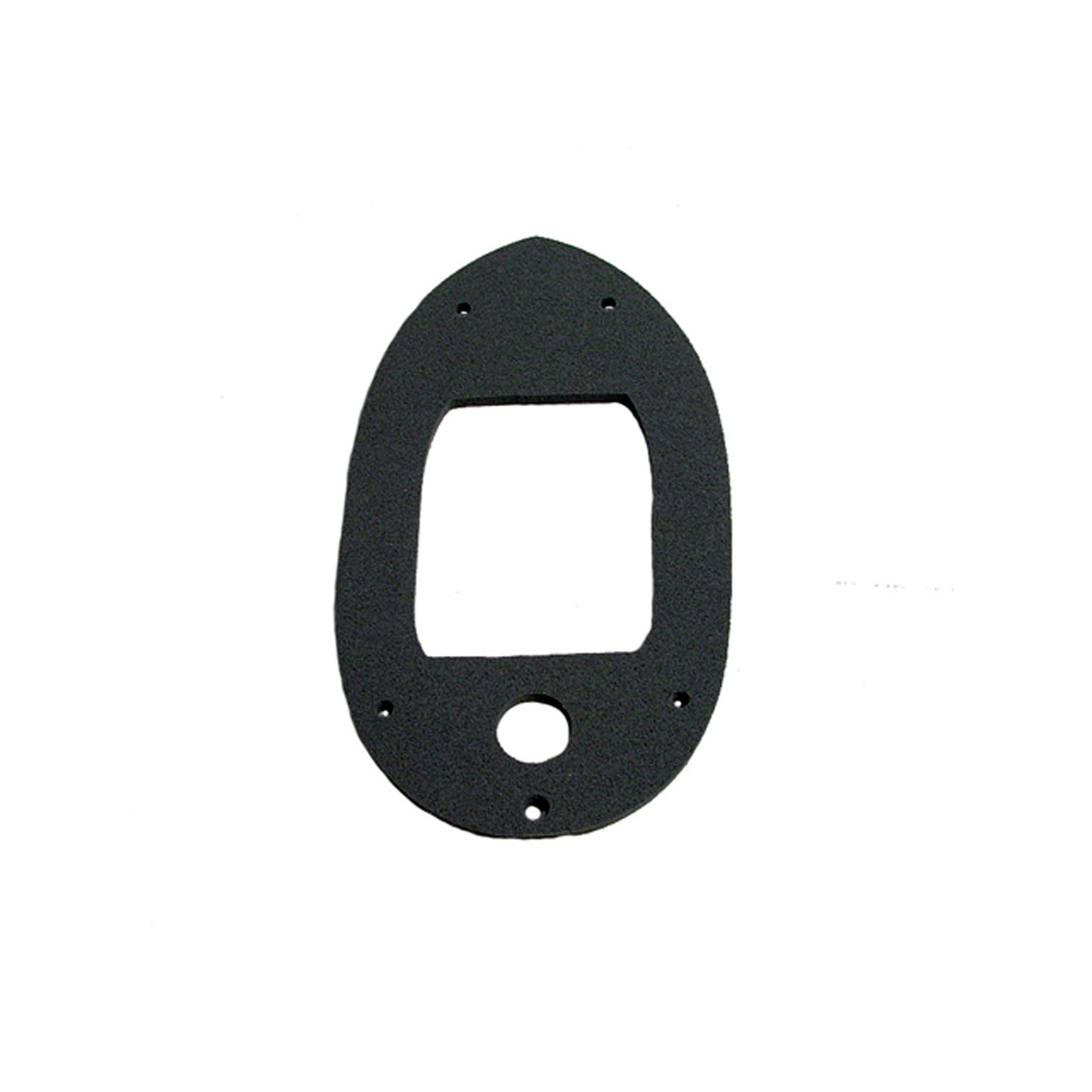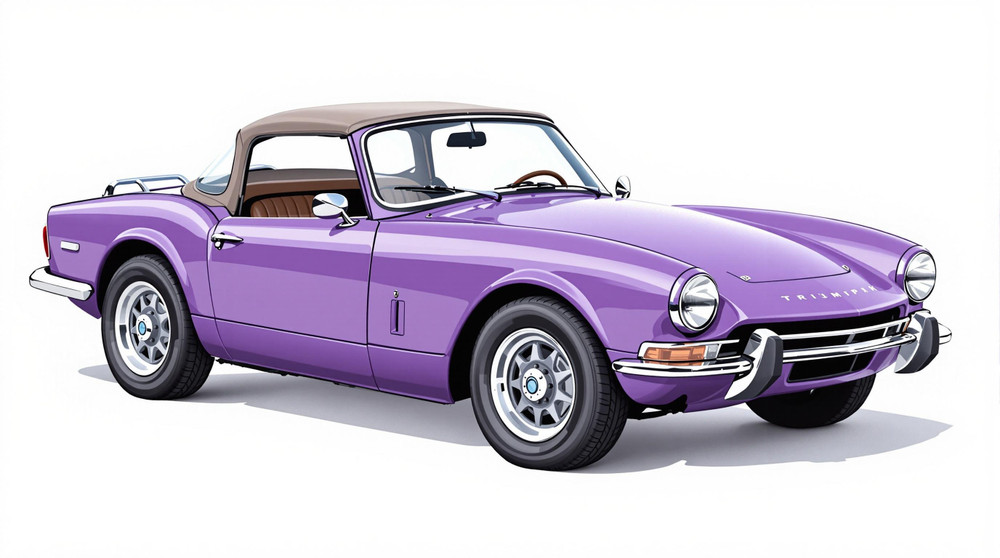Image of 1969 Triumph Spitfire, Note: These illustrations use artistic license and may differ from actual historical models.
Performance Metrics
Fundamental Metrics
Emotional Appeal
MMP Rating
| Engine Specifications | |
|---|---|
| Engine: | Inline 4 |
| Displacement: | 1.3L (1296 cc) |
| Horsepower: | 75 hp |
| Torque: | 72 lb-ft |
| Compression Ratio: | 9.0:1 |
| Ignition System: | Electronic |
| Cooling System: | Water-cooled |
| Performance Specifications | |
| 0-60 Time: | 13.4 seconds |
| 1/4 Mile Time: | 18.3 seconds |
| Top Speed: | 95 mph |
| Transmission and Drive | |
| Drive Type: | RWD (Rear Wheel Drive) |
| Transmission Type: | 4-speed manual |
| Fuel and Efficiency | |
| Fuel System Type: | Carburetor |
| MPG: | 25-30 mpg |
| Dimensions and Brakes | |
| Brakes: | Disc brakes front, drum rear |
| Wheelbase: | 83 inches |
| Weight: | 1,568 lbs |
Note: Specifications for classic cars are given to the best of our ability, considering the limited and variant data available.
Unveiling the Charm of the 1969 Triumph Spitfire
The year 1969 witnessed the emergence of a British motoring icon – the Triumph Spitfire. Crafted by the skilled hands at Triumph Motor Company, this sprightly roadster was a testament to British automotive ingenuity. The Spitfire's lineage can be traced back to its conception as a cost-effective sports car, designed to conquer both hearts and roads with equal aplomb. Its historical significance is anchored in the era of swinging London, capturing the youthful spirit of the late 60s. A notable moment in its storied past includes its namesake – inspired by the legendary Supermarine Spitfire aircraft, a symbol of triumph and agility during World War II.
Design and Innovation
The exterior styling of the 1969 Triumph Spitfire was a harmonious blend of sleek lines and charming proportions. Its low-slung profile and distinctive front grille made it instantly recognizable. Inside, the cockpit was a no-frills affair, with an emphasis on driver engagement over luxury. Materials were modest yet durable, with an array of vinyl and hard plastics that have stood the test of time. Technologically, it boasted features like independent rear suspension – a rarity among affordable sports cars of that era. The color palette ranged from vibrant reds to deep blues, with Signal Red being a particularly popular choice among enthusiasts. The roadster body style remained quintessential, with options such as wire wheels and overdrive transmissions enhancing its appeal.
Historical Significance
The Triumph Spitfire carved out a niche in automotive history through its blend of affordability and performance. It democratized sports car ownership, allowing those with modest means to indulge in the thrill of driving. Its lasting influence is evident in the design language of small roadsters that followed, continuing to inspire automakers and enthusiasts alike.
Performance and Handling
Underneath its bonnet lay a lively 1,296 cc engine that propelled the lightweight chassis to respectable speeds for its time. The top speed hovered around 95 mph, while acceleration from 0-60 mph took approximately 17 seconds. Handling was nimble; the Spitfire took to winding roads with eagerness, though it could be unforgiving over rough surfaces due to its firm suspension setup. Driving one was an immersive experience – from the throaty exhaust note to the tactile feedback through its thin-rimmed steering wheel.
Ownership Experience
The 1969 Triumph Spitfire served various roles from daily commuting to weekend racing escapades. Owners appreciated its straightforward mechanicals which made maintenance manageable for DIY enthusiasts. Reliability was typical for British cars of the period; attentive care was key to trouble-free ownership.
Fun Facts
This automotive jewel has graced both small screens and silver screens alike, adding charm to numerous film and television appearances. While not known for breaking speed records, it held its own in endurance rallies and club races. Criticisms often centered around electrical gremlins – a common trait among British cars of that era.
Collector's Information
Today, a well-preserved 1969 Triumph Spitfire can fetch anywhere from $10,000 to $20,000 depending on condition and provenance. Production numbers were generous for their time; however, survivors in pristine condition are becoming increasingly rare. The market trend shows appreciation for this model as nostalgia fuels demand for classic British roadsters.
Conclusion
The 1969 Triumph Spitfire remains an emblematic figure in classic motoring circles – accessible yet spirited; simple yet captivating. It's more than just a car; it's a slice of history on wheels that continues to enchant generations with its undying charm.
1969 Triumph Spitfire Catalog of Parts
 1969 Triumph Spitfire Tail-light Lens Gasket. Each-MP 999-CCTail-light Lens Gasket. Each
1969 Triumph Spitfire Tail-light Lens Gasket. Each-MP 999-CCTail-light Lens Gasket. EachWhy Choose Metro?
For over 100 years, Metro Moulded Parts has been the pinnacle of quality in classic car restoration parts. Our commitment to precision and authenticity in every component ensures a perfect fit and an OEM-level appearance.
- Expert Craftsmanship & Quality: Each part is a testament to our dedication to reliability and perfection, crafted from original designs and thoroughly tested.
- Advanced Technology: We use cutting-edge techniques to create flawless, long-lasting parts that surpass others in performance.
- SuperSoft Sponge – The Ultimate Door Seal: Not only are our door seals 30% softer than competitors', but they're also guaranteed to never leak. They effectively reduce wind and road noise, enhancing your classic car's comfort and driving experience.
- Proudly American: Our parts are a product of American craftsmanship, made in the USA with a spirit of excellence and heritage.
- Unrivaled Warranty: We back our products with a 30-year industry-leading warranty, a testament to our confidence in their quality.
Join us in preserving the legacy of classic cars with parts that are crafted for perfection, not just made.

